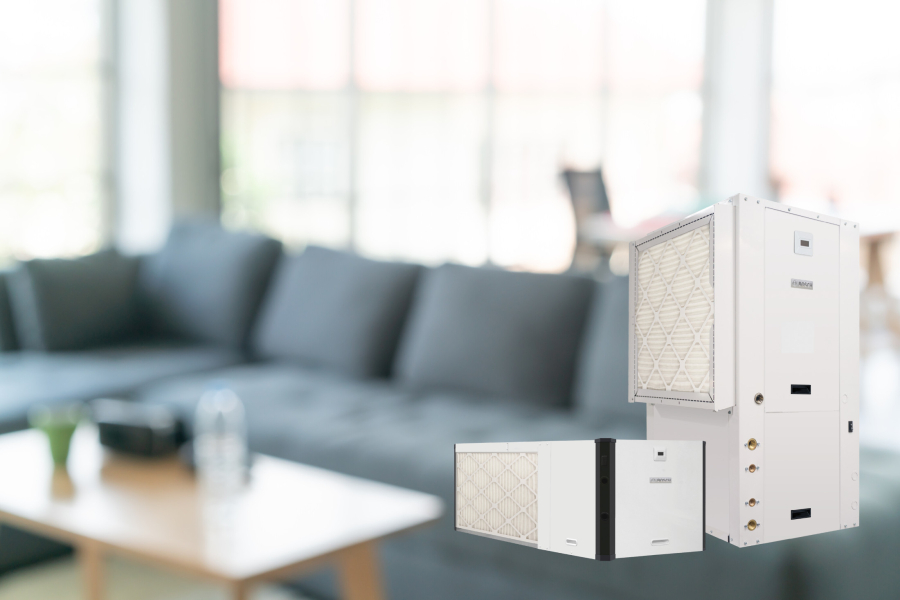
As environmental conservation continues to become a hot topic, many people have started utilizing green energy in their homes and commercial buildings. One common way people do this is by installing air to water heat pumps.
Why Should You Install An Air To Water Heat Pump?
Air to water heat pumps use only electricity to operate, meaning they do not produce any C02, as opposed to heat pumps that use oil, gas, or wood.
These pumps draw heat from outside air to water, heating the room via underfloor heating or radiators. The heat production is economical and safe thanks to the indoor unit's climate system, circulation pump, immersion heater, and integrated water heater.
The pumps have an outdoor unit that fetches the air from outdoor air and transfers it to a coolant. A compressor then increases the coolant's temperature, causing it to transfer the heat through a heat exchanger to a hot water reverse tank.
The hot water is then circulated to faucets and radiators, giving off the heat. The now cold water is moved back to the reserve tank and back to the outdoor unit. Before deciding to upgrade your system, you should research its benefits to determine whether it is the right choice for your building.
Air to Water Heat Pump Dual Purpose
This is one of the main reasons many homeowners are upgrading their traditional heat pumps with air to water. You can use the pump for heating and cooling, reducing the cost and time of installing a heat pump and air conditioning. It also reduces the space you need for two separate systems or fuel storage.
Before buying an air to water heat pump, ensure it has a Coefficient of Performance (COP) of over 0.7 for cooling.
You can also use these pumps for space heating or hot water across appliances. However, this depends on the type of pump and water temperature in the heating system, also referred to as flow temperature.
Air to water pumps that can heat water usually have a flow temperature of around 55 degrees C. Otherwise, the flow temperature usually is 35 degrees C.
Improved Air Quality
Air to water heat pumps come with easily replaceable filters. That means they can help capture and eliminate allergens and contaminants from indoor air. Depending on your filter, it can help eliminate smoke particles, dust, pet dander, toxic gases, pollen, chemicals, hair, dead skin, bacteria, viruses, mold spores, aerosols, and other pollutants.
If you use high-efficiency particulate air (HEPA) filters, you can remove up to 99.97% of contaminants as tiny as 0.3 microns.
Since you can use your air to water pump for cooling and heating, it guarantees comfortable indoor conditions throughout the winters and summers. It also helps regulate humidity during the two seasons.
High humidity levels throughout summer can result in fatigue, dehydration, skin and throat irritation, poor sleep quality, and allergy-like symptoms. On the other hand, too little humidity during winter causes dry skin, irritated throat and nasal pathways, itchy eyes, and dry lips.
These pumps work as dehumidifiers during summer and humidifiers during winter. Consider installing underfloor heating to get the best out of your air to water heat pump.
Some pumps also let you heat or cool your home separately in zones or different rooms. That is important if you have some colder or hotter rooms or if people have different heating needs. It also helps in saving utility bills because you don't have to heat or cool the entire house when only using one room.
Quieter Performance
While traditional heat pumps heat the whole house efficiently, one disadvantage is their loud running noise. It can be an inconvenience in the home, even causing uneven sleeping patterns.
Sound is usually measured using decibels (dB), with softer sounds having lower dB readings. Many air to water heat pumps generally run at around 40 to 60 dB, compared to AC units or dishwashers, running at about 60 dBs.
You should also remember that most of the pump's noise comes from outdoors. Therefore, if you have ductless mini splits in the building, the noise will probably reduce to around 20-40 dB.
Energy-Efficient And Renewable Energy
Air to water heat pumps can generate over four kilowatt-hours of heat using one kilowatt-hour of electricity, meaning you will be consuming less power than when using a traditional heat pump. While these pumps use electricity, they only consume around 25% compared to conventional heat pumps.
The other 75% comes from the hot air they capture from outside, a renewable energy source. While many might wonder if they will remain uncovered during the cold months, the pumps can generate heat from outdoor air even when the air is as cold as -15 degrees C.
Since outdoor air is free and always available, it helps cut the pump’s operational cost considerably, especially if you are changing from a gas or coal system.
Qualification For The Home Efficiency Rebate Program
The Home Efficiency Rebate program is dedicated to ensuring that homeowners around Canada strive to make their homes greener. The Canadian government aims to achieve net-zero emissions by 2050, and the incentives of this program might encourage people to transit to greener energy sources.
Upgrading your heating system to an air to water heat pump can qualify you for the program, provided you are a Canadian homeowner and can prove that the house is your primary residence. You should also have your property's tax bill number.
The Canadian government says the program will offer 700,000 grants to pay for several home improvements for more energy-efficient homes nationwide.
The amount you receive depends on how energy-efficient your house is when applying for the grant, plus the results of pre and post-retrofit evaluations. Having an air to water heat pump is one of the ways to increase your house's energy efficiency and increase your chances of getting the grant.
Before contracting an installation company for your new heating system, it is essential to research and compare. Look at their experience, skills, expertise, reputation, past projects, warranty, and customer reviews.
It would help if you also considered whether they offer repair and maintenance services to ensure your system remains well-taken care of in the long run.
---
In Toronto, there is no one more skilled in heat pump installation, repairs, and maintenance services than The Boiler Shoppe. With over 35 years of experience in heating, ventilation, and air conditioning installation, repairs, and maintenance, The Boiler Shoppe's electrical installation services are unmatched. Get in touch with us today for a quote.
